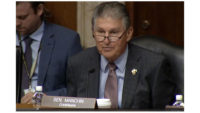Sen. Joe Manchin (D-W.Va.) has released his promised legislative proposal that aims to speed federal environmental review of pipeline and power transmission projects. The bill, unveiled on Sept. 21, is set to be attached to a must-pass stopgap spending bill needed to keep the government operating when the new fiscal year begins Oct. 1.
Senate consideration of permitting legislation was the condition that Manchin, chair of the Energy and Natural Resources Committee, won from Senate Majority Leader Chuck Schumer (D-N.Y.) to support the Inflation Reduction Act climate and health care package that President Joe Biden signed in August.
But the outlook for the permitting proposal by then is unclear. Democrats have the slimmest of margins in that chamber, and Sens. Bernie Sanders (I-Vt.) and Edward Markey (D-Mass.) have said they oppose adding the Manchin bill to the spending measure.
Another possible option is attaching the permit reform measure to the National Defense Authorization Act, the military spending bill that Schumer said would be debated in October before Congress adjourns for the November midterm elections.
Manchin's bill got a lift however on Sept. 22 when Sen. Shelley Moore Capito (R-W.Va.) told reporters that she would support it. A Capito spokesperson confirmed to ENR the senator's comments.
Ten days earlier, Capito proposed her own bill that included permitting provisions but also covered more environmental policy and regulatory areas than Manchin's did.
But she noted that she liked that Manchin's proposal is "very similar" to hers.
Similarities to Enacted Highway Bills
According to a summary, the Manchin proposal would extend to pipelines and other energy infrastructure projects the same "streamlining" provisions that already apply to highways and other transportation projects under the Infrastructure Investment and Jobs Act and other statutes.
Those provisions include a two-year goal for National Environmental Policy Act reviews for "major energy and natural resource projects."
Manchin's proposal also would designate a single lead agency to coordinate a project's environmental reviews, set a 150-day statute of limitations to file court challenges to energy projects and require Biden to designate 25 energy projects of strategic national importance for speedy review.
Steve Hall, American Council of Engineering Cos. senior vice president for advocacy, said in an interview, "The bill overall lays out an approach to regulatory streamlining that is consistent with what Congress has already [done] in the transportation space and just sort of extending that to the energy space and to some extent, the water space."
Hall said, "On that basis, the legislation and what it is proposing is pretty logical and something that we certainly can support."
West Virginia Pipeline
The measure also would specifically require federal agencies to approve construction of the controversial Mountain Valley Pipeline. The natural-gas pipeline would run about 300 miles, from northwest West Virginia to southern Virginia.
The project has had a long path through the federal review process and the courts. It is still awaiting approval from several federal agencies, and has been stalled following successful legal challenges by environmental groups.
Capito said she was "very happy" that Manchin's bill includes the Mountain Valley Pipeline provision.
The bill that Capito proposed would expedite permitting but go well beyond that to codify several Trump administration environmental actions. They including a more restricted definition of federally regulated Waters of the United States than one proposed by the Biden administration.
Capito introduced her bill, titled the Simplify Timelines and Assure Regulatory Transparency, or START, Act, on Sept. 12. It had 46 initial co-sponsors, all Republicans.
Energy Groups Weigh In
Amy Andryzak, Interstate Natural Gas Association of America (INGAA) president and chief executive officer, said in a Sept. 22 emailed statement, "Permitting reform must confront challenges and delays that have hampered the development of domestic energy infrastructure."
Andryzak added, "While we are still reviewing the proposal introduced [Sept. 21] to better understand how it will impact our industry, Senator Manchin should be commended for keeping this critically important bipartisan issue at the forefront of the national dialogue." She said INGAA would work with lawmakers from both parties on legislation dealing with pipeline infrastructure permitting.
Karen Harbert, president and CEO of the American Gas Association, said in an emailed statement, "Senators Manchin and Capito deserve credit for keeping the spotlight on permitting reform." She added, "This is not a partisan problem—this is an American problem—and we are eager to work with anyone who is interested in solutions."
The text of this article was updated on Sept. 22, 2022, with engineering and energy group comments and Senator Capito's statement supporting Manchin's bill.





